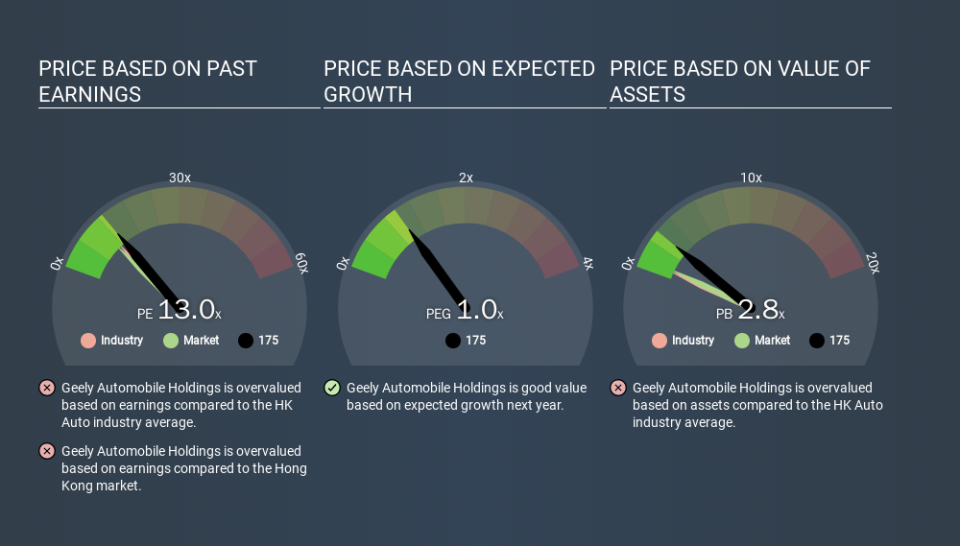What Does Geely Automobile Holdings Limited's (HKG:175) P/E Ratio Tell You?

Today, we'll introduce the concept of the P/E ratio for those who are learning about investing. To keep it practical, we'll show how Geely Automobile Holdings Limited's (HKG:175) P/E ratio could help you assess the value on offer. Based on the last twelve months, Geely Automobile Holdings's P/E ratio is 12.98. In other words, at today's prices, investors are paying HK$12.98 for every HK$1 in prior year profit.
See our latest analysis for Geely Automobile Holdings
How Do I Calculate Geely Automobile Holdings's Price To Earnings Ratio?
The formula for price to earnings is:
Price to Earnings Ratio = Share Price (in reporting currency) ÷ Earnings per Share (EPS)
Or for Geely Automobile Holdings:
P/E of 12.98 = HK$14.25 (Note: this is the share price in the reporting currency, namely, CNY ) ÷ HK$1.10 (Based on the year to June 2019.)
Is A High P/E Ratio Good?
A higher P/E ratio means that buyers have to pay a higher price for each HK$1 the company has earned over the last year. That is not a good or a bad thing per se, but a high P/E does imply buyers are optimistic about the future.
Does Geely Automobile Holdings Have A Relatively High Or Low P/E For Its Industry?
The P/E ratio essentially measures market expectations of a company. You can see in the image below that the average P/E (11.4) for companies in the auto industry is lower than Geely Automobile Holdings's P/E.
That means that the market expects Geely Automobile Holdings will outperform other companies in its industry. Shareholders are clearly optimistic, but the future is always uncertain. So investors should delve deeper. I like to check if company insiders have been buying or selling.
How Growth Rates Impact P/E Ratios
P/E ratios primarily reflect market expectations around earnings growth rates. Earnings growth means that in the future the 'E' will be higher. And in that case, the P/E ratio itself will drop rather quickly. So while a stock may look expensive based on past earnings, it could be cheap based on future earnings.
Geely Automobile Holdings shrunk earnings per share by 24% over the last year. But it has grown its earnings per share by 32% per year over the last five years.
Remember: P/E Ratios Don't Consider The Balance Sheet
Don't forget that the P/E ratio considers market capitalization. So it won't reflect the advantage of cash, or disadvantage of debt. The exact same company would hypothetically deserve a higher P/E ratio if it had a strong balance sheet, than if it had a weak one with lots of debt, because a cashed up company can spend on growth.
Such spending might be good or bad, overall, but the key point here is that you need to look at debt to understand the P/E ratio in context.
How Does Geely Automobile Holdings's Debt Impact Its P/E Ratio?
Since Geely Automobile Holdings holds net cash of CN¥11b, it can spend on growth, justifying a higher P/E ratio than otherwise.
The Bottom Line On Geely Automobile Holdings's P/E Ratio
Geely Automobile Holdings's P/E is 13.0 which is above average (10.6) in its market. The recent drop in earnings per share might keep value investors away, but the relatively strong balance sheet will allow the company time to invest in growth. Clearly, the high P/E indicates shareholders think it will!
Investors should be looking to buy stocks that the market is wrong about. If the reality for a company is better than it expects, you can make money by buying and holding for the long term. So this free report on the analyst consensus forecasts could help you make a master move on this stock.
But note: Geely Automobile Holdings may not be the best stock to buy. So take a peek at this free list of interesting companies with strong recent earnings growth (and a P/E ratio below 20).
If you spot an error that warrants correction, please contact the editor at editorial-team@simplywallst.com. This article by Simply Wall St is general in nature. It does not constitute a recommendation to buy or sell any stock, and does not take account of your objectives, or your financial situation. Simply Wall St has no position in the stocks mentioned.
We aim to bring you long-term focused research analysis driven by fundamental data. Note that our analysis may not factor in the latest price-sensitive company announcements or qualitative material. Thank you for reading.

